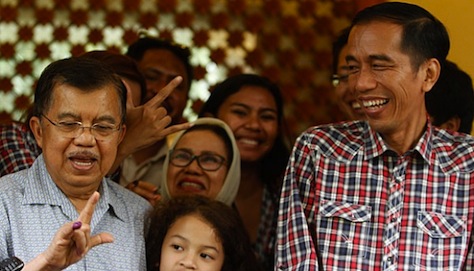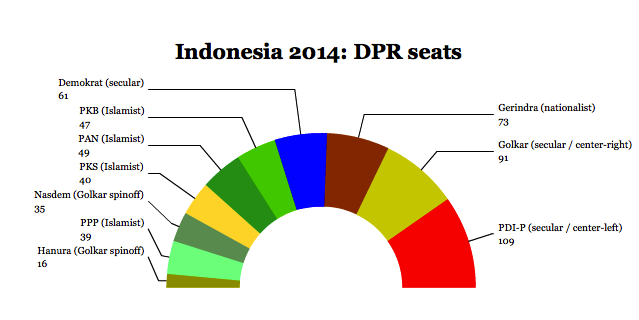It’s official — with Monday’s announcement that Indonesian presidential frontrunner Joko Widodo (‘Jokowi’) has chosen former vice president and former Golkar party chair Jusuf Kalla as his running mate, the chief presidential tickets and their alliances for the July 9 election are now largely settled.![]()
The Jokowi-Kalla ticket pairs the young Jakarta governor, age 52, with a longtime steady hand who, at age 71, is nearly two decades older than Jokowi, the standard-bearer of the Indonesian Democratic Party of Struggle (PDI-P, Partai Demokrasi Indonesia Perjuangan), which emerged as the strongest in Indonesia’s parliamentary elections in April shortly after naming Jokowi as its presidential candidate. Its leader, Megawati Sukarnoputri, daughter of Indonesia’s first post-independence president, and a former president between 2001 and 2004, remains a powerful figure behind the scenes.
Kalla (pictured above, left, with Jokowi) previously served as vice president between 2004 and 2009 under outgoing president Susilo Bambang Yudhoyono (known in Indonesia as ‘SBY’). The two often clashed, and Kalla often appeared the more substantial figure, given his party’s much larger bloc of seats at the time in the Dewan Perwakilan Rakyat (DPR, People’s Representative Council), the lower house of the Indonesian parliament. Though Kalla will undoubtedly boost Jokowi’s chances of winning in July, there’s a risk that he could come to be seen as the puppet-master of a future Jokowi-led administration.

Despite last-minute speculation that Kalla’s party, Golkar (Partai Golongan Karya, Party of the Functional Groups), would support Jokowi, Kalla seems to have split from his party to join Jokowi’s ticket. Golkar will instead back the presidential candidacy of Prabowo Subianto, the leader of Gerindra (Partai Gerakan Indonesia Raya, the Great Indonesia Movement Party), itself a spinoff from Golkar in 2008.
* * * * *
RELATED: ‘Jokowi’ effect falls slat for PDI-P in Indonesia election results
RELATED: Veepstakes, Indonesia-style: Will Kalla return as vice president?
* * * * *
What’s remarkable is that Golkar’s leader, former presidential candidate Aburizal Bakrie, ultimately supported Prabowo without winning the vice presidential slot for himself.
Instead, Prabowo last week chose Hatta Rajasa, the chair of the Partai Amanat Nasional (PAN, National Mandate Party), a moderate Islamist party. Hatta (pictured above, right, with Prabowo) has served since 2009 as coordinating minister for economics in the current administration; he previously served from 2007 to 2009 as state secretary and from 2004 to 2007 as transportation minister. He’s been the chairman of the PAN since 2010 — and he has deeper ties to Yudhoyono, given that his daughter is married to Edhie Baskoro, the president’s youngest son.
What does Kalla bring to the ticket? Aside from experience, he’ll bring the gravitas of someone who can balance Megawati’s influence in a Jokowi administration. He’ll bring a great deal of support to the ticket from his native Sulawesi and from his wider base in eastern Indonesia. Even if Prabowo has Golkar’s formal support as a party, many of its voters will follow Kalla’s lead and vote for Jokowi.
Kalla, too, is Muslim, and he’s a member of Nahdlatul Ulama (NU), a longtime Sunni Islamic civil society group, so the Jokowi-Kalla ticket will win at least some Muslim votes. Though three Islamist parties have backed Prabowo, the one that won the most votes in the April legislative elections, the Partai Kebangkitan Bangsa (PKB, National Awakening Party), is backing Jokowi.
So now that Indonesia’s version of ‘veepstakes’ is over, where does that leave the two presidential campaigns?
Possibly the most important dynamic is that the race has narrowed to two campaigns — Aburizal’s withdrawal eliminates the flawed candidacy of an unpopular candidate. That make July’s presidential election a clear fight between Joko Widodo, who will presumably become the candidate of greater economic liberalization (up to a point), and Prabowo Subianto, the candidate more in favor of greater economic protection (up to a point).
Golkar’s unexpected support gives Prabowo a much more serious shot at winning the presidency. In addition to the PAN, both the Partai Keadilan Sejahtera (PKS, Prosperous Justice Party) and the Partai Persatuan Pembangunan (PPP, United Development Party) are supporting Prabowo. With three of the four major Islamist parties and Golkar behind him, Prabowo has assembled a formidable coalition.
With Hatta as his running mate, Prabowo brings to the ticket someone from south Sumatra who can consolidate the Islamist vote behind his presidential campaign. He also brings the top economics official of the incumbent administration, and someone with close ties to the still-neutral Yudhoyono and his party, the Partai Demokrat (Democratic Party).
While polls show Prabowo’s ticket trailing by double digits, the contest is shaping up as a much more serious one than originally imagined, especially if Prabowo finds a way to win over the Democrats.
Though Yudhoyono officially reiterated the Democratic Party’s neutrality over the weekend, he has the luxury of time. While neither Jokowi nor Prabowo need the Democrats to surpass the official threshold for their presidential campaigns (the support of parties with at least 25% of the national vote in the parliamentary elections or at least 20% of the seats in the DPR), the ultimate winner will need the Democrats to form a stable legislative majority.
That means that the Democrats could remain neutral through the election and join forces with the winner in July. But there are some signs that the Democrats could back Prabowo, given Hatta’s close ties to the outgoing administration. Relations between Megawati and Yudhoyono, her former security minister, have been frosty for the last decade — Megawati lost both the 2004 and 2009 presidential races to him, and she’s loathe to seek out his endorsement in 2014.
Two smaller secular parties, Surya Paloh’s Nasdem (Partai Nasdem) and Hanura (Partai Hati Nurani Rakyat, The People’s Conscience Party), yet another Golkar spinoff, led by retired general Wiranto, are also supporting the Jokowi-Kalla ticket.
* * * * *
For reference, here’s the breakdown of seats in the DPR:
Also for reference, here’s where the coalitions now stand:
Jokowi-Kalla: 207+ seats
- PDI-P: 109 seats. The traditional party of Sukarno, and the party of his daughter, Megawati Sukarnoputri, and of Jakarta governor and presidential candidate Joko Widodo. Leans traditionally to the center-left, and has served as Indonesia’s chief opposition since 2004.
- PKB: 47 seats. Currently the largest of the four major Islamist parties in Indonesia, the National Awakening Party is closest to Nahdlatul Ulama, the Sunni group founded in 1926, and the party of former president Abdurrahman Wahid (also known as Gus Dur). Like all the major Islamist parties, it currently supports Yudhoyono’s Democrat-led government.
- NasDem: 35 seats. A 2011 spinoff of Golkar, founded by media businessman Surya Paloh.
- Hanura: 16 seats. Another Golkar spinoff, founded by the controversial retired general Wiranto, who had ties to the Suharto regime that fell in 1998, and who is accused of human rights abuses in East Timor.
- Kalla faction of Golkar: ?? seats. Kalla, as a former vice president under Yudhoyono between 2004 and 2009, and as a prominent former Golkar chairman in the mid-2000s, will bring at least some loyal Golkar supporters to the Jokowi campaign.
Prabowo-Hatta: 302- seats
- Gerindra: 73 seats. Prabowo, another former Golkar official, formed this party, an economically and politically nationalist party in 2008. It’s been part of the opposition, and in 2009, Prabowo served as Megawati’s running mate.
- Golkar: 91 seats. Though it seemed to be lurching between the two presidential candidates, and toying with the idea that its current chair, Aburizal Bakrie, would run for president, it’s now supporting Prabowo, though Kalla’s decision to join forces with Jokowi could divide Golkar’s ranks. Golkar has supported Yudhoyono’s government — sometimes eclipsing Yudhoyono’s own Democrats — since 2004.
- PAN: 49 seats. Another leading Islamist party, the National Mandate Party is the party of Hatta, who had served as economics minister since 2009, and who will now join the ticket as Prabowo’s running mate.
- PKS: 40 seats. Another Islamist party.
- PPP: 49 seats. The fourth of the major Islamist parties.
Unaligned: 61 seats
- Democrats: 61 seats. The party of the outgoing president is still undecided if it will join either coalition or if it will remain in opposition. Megawati is still angered by Yudhoyono’s decision in 2004 to seize what she believed was her right to the presidency, while Hatta has been one of Yudhoyono’s top officials over the past decade, so there’s a greater chance the Democrats would ultimately join forces with Prabowo.

